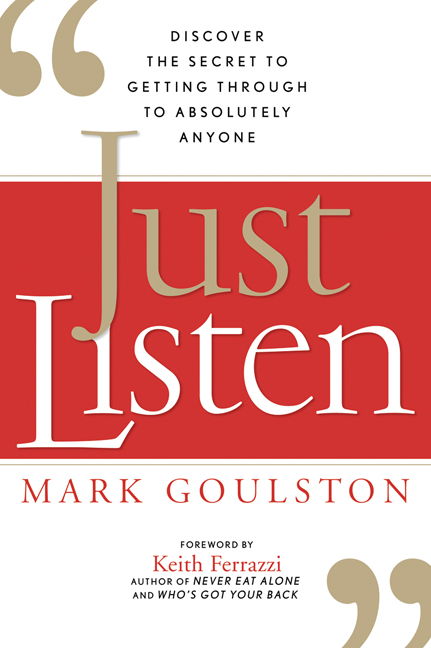Today, I spoke to Mark Goulston, M.D., who is a business advisor, consultant, trainer and coach trained as a clinical psychiatrist and author of the new book, Just Listen: Discover the Secret to Getting Through to Absolutely Anyone. In this interview, Mark compares listening and speaking, goes over the elements of persuasion, shares some tips for getting attention at work and more.
Mark, can you compare listening and speaking. Which is more important during a ne tworking situation and why?
tworking situation and why?
Your partner, spouse or kids are not the only ones who don’t want an unsolicited opinion or advice or to be convinced of something. The people you meet in a networking situation actually feel the same even though paradoxically they want something from you. Is that difficult to believe? How would you feel if someone overtly (vs. covertly) said to you without being asked: “I’m here to sell you on hiring me or purchasing my service or product.”
Your goal in a networking situation is to say the least possible that will spontaneously trigger a response such as, “How do you do that?” or “Tell me more,” or “I need to follow up with you; what’s the best way to get in touch with you?” or “Can I call you tomorrow?” or “Are you accepting new clients or customers?”
Speaking more than you listen, jumping to conclusions, and interrupting people are highly unlikely to generate the responses above. What will generate those responses is asking questions and then listening intently to the answers in a way that shows genuine interest in the other person. In doing so, this will trigger reciprocal interest in you – except in the case of “dyed in the wool” takers – with whom you should be careful about revealing too much.
Sample questions that trigger spontaneous responses from others include:
- Show your interest in the service or product: “What do you (or your service or product or company) do, and who do you do it for, and when?”
- Go deeper and show an interest in another individual as a person: “How did you get into that?” “What’s the best part of what you do?”
- One of my favourite questions (I can get away with this as a psychiatrist, but when you have time you can also ask it) is: “Where and from who did you learn the best lessons on how to succeed in life, and what were those lessons?”
This last question is terrific, because it causes the other person to remember someone they feel grateful to and what they feel grateful about…and at some level they will be grateful to you for giving them the chance to feel it.
What is the relationship between listening and persuading someone to do something?
Everybody functions as if they were in a silo. And every silo looks at the world differently. When you try to persuade someone without knowing or caring where that person is coming from (because you too are blinded by your siloed view of the world), it’s like entering that person’s room or office without knocking.
Listening deeply earns you the right to persuade people to do something. I usually make the transition between listening and persuading transparently (vs. sneakily) by saying to someone after I have heard them out, “Might I make an observation from what you’ve said?” At that point I can summarize what I’ve heard and then come to a conclusion that begs for a solution. For instance, I may say: “I’ve heard that you want to accomplish such and such a goal by year-end, but I’ve also heard that your people may not be skilled enough to pull it off and so I wonder what training you have in place for them to get up to speed?”
How do you break through emotional barricades by listening and what results will you receive?
It’s what I call, “listening with my eyes,” and commenting on a barricade or roadblock I am noticing. So if someone seems resistant to something we have spoken about that makes patent and obvious sense, I might say: “I see you nodding that what we are talking about makes sense, and yet I perceive something is holding you back. What question haven’t I asked or situation haven’t we addressed that if we addressed, would address and ease some of the reluctance you are having right now about our moving forward with this?”
The key is that when the other person begins to tell you about their internal reservations, you acknowledge those reservations instead of bulldozing through them. Invite the other person into collaboration to solve their reservations. You can do so by saying something like: “I understand exactly where you’re coming from and your hesitation. Since you have agreed that what we’re talking about makes sense, how might we resolve or work around that issue that is causing you to hesitate?”
What are your top three tips for making your manager or co-workers pay attention and care about your work?

- A lob into the future. Ask your manager or co-workers to imagine it is a year down the road and they are evaluating the past year. Say, “It was much better than any of us could have expected and we dodged a few bullets that we normally would not have paid attention to.” After they agree to do that, ask them to answer: “What happens this year to make that so?” Finally, articulate with them how and where what you do will play a critical role in that success.
- Anticipatory Performance Review Training. Say to your boss or co-worker, “At my next performance review I am looking to have everyone who weighs in on it to say, ‘Give him a promotion and more money.’ What results will I need to get for that to occur?” Whatever they say, repeat it exactly back to them and wait for a confirmatory, “Yes.” A confirmatory “Yes” deepens their commitment to giving you the promotion or raise when you achieve those results. To make those results more achievable for you say to them: “In the event going forward I see that I need additional training or that I have to let go of some other projects I’m working on, and you may need to run interference for me, what’s the best way to elicit support from you on either issue?”
- Earning respect gets you noticed. Say to your manager or co-worker that you have made a commitment to improve your performance, increase your results and the respect that people have for you and would like their help. Therefore you would like them to point out three things you should always do and three negative things you should never do that would cause them to increase their respect for you and also probably impact on your performance and results.

How have you built your own personal brand?
I am still a medical doctor at heart, because what still drives me in my relationships with other people is to listen deeply to them. My goal is to be of service to the other person without keeping score of what I am getting in return. Because of my natural inclination to be of service to others, it is important for me to select people to be involved with who are reciprocal by nature. I have developed relationships with some of the top CEO’s in the country by practicing exactly that. I never sell them on anything; I always try to make their lives better. With time – and after they realize that I have no hidden agenda – they spontaneously reciprocate and want to help make my life better.
And as MasterCard might say, “Generosity from a Fortune 500 CEO…priceless.”
—–
Mark Goulston, M.D. is a business advisor, consultant, trainer and coach trained as a clinical psychiatrist. He is a Fellow of the American Psychiatric Association and was named one of America’s Top Psychiatrists for 2004-2005 and again in 2009 by Washington, D.C. based Consumers’ Research Council of America. A partial list of companies and organizations he has trained, spoken to, provided executive coaching to or consulted with include: GE, IBM, Goldman Sachs, and Merrill Lynch. He is a member of the National Association of Corporate Directors and the Worldwide Association of Business Coaches and is the best selling author of four books including Just Listen: Discover the Secret to Getting Through to Absolutely Anyone (AMACOM, 2009), is a contributor to Harvard Business, blogs for the Huffington Post, writes the Tribune media syndicated column, Solve Anything with Dr. Mark, column on leadership for FAST COMPANY, Directors Monthly. He is frequently called upon to share his expertise with regard to contemporary business, national and world news by television, radio and print media including: Wall Street Journal, Harvard Business Review, Fortune, Newsweek, Time, Los Angeles Times, ABC/NBC/CBS/Fox/CNN/BBC News, Oprah, Today.












